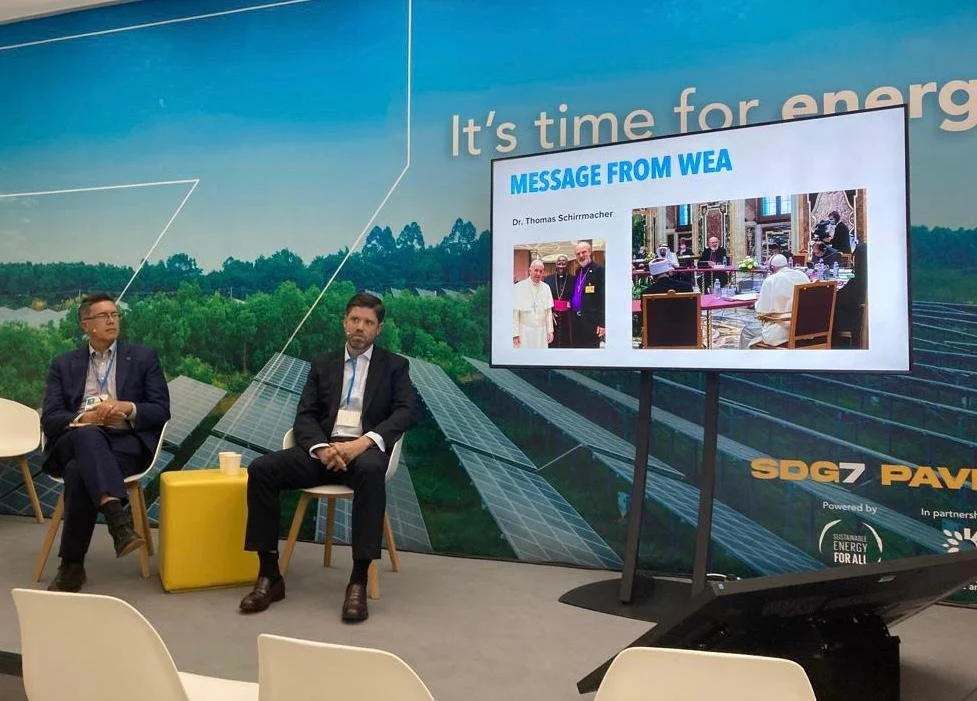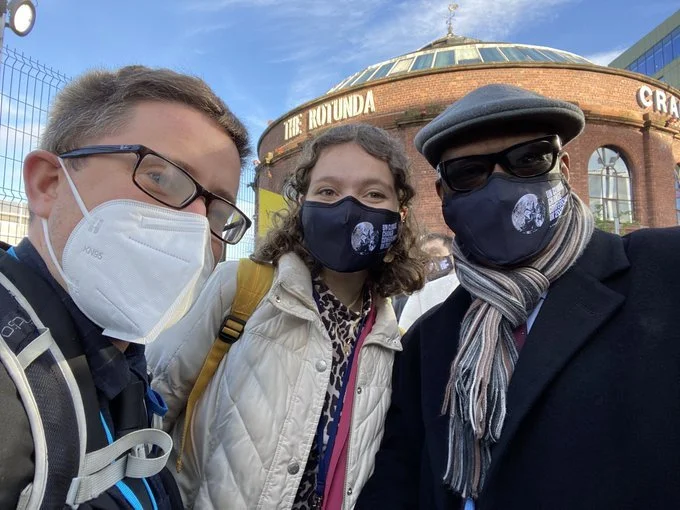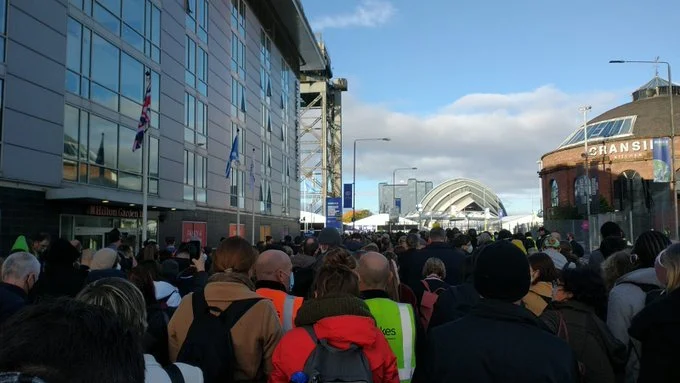Update from World Evangelical Alliance | 11/11/21
Chris Elisara
In addition to being in observing mode, some organizations are able to be COP actors by adding their work and ideas to the contributions spotlighted at COP to redress the climate crisis. This afternoon, the World Evangelical Alliance (WEA) did exactly that at the SDG7 Clean Energy for All pavilion.
The thrust of the WEA’s presentation was to reaffirm its commitment to help 20 percent for the evangelical community’s footprint—churches, schools, hospitals, households, etc., convert to clean renewable energy by 2025, but more importantly to introduce Relight, a new technology platform that fosters online networks and communities that facilitates dialogue and collaboration to solve problems together. We, the Christian community, have major barriers and challenges to delivering clean renewable energy to churches and Christian households around the world. As the WEA’s Secretary General, Dr. Thomas Schirrmacher said in today’s presentation, however, “I hope the first question put on Relight is how can a very small country [like the Seychelles I just visited] become independent of oil and be run by clean renewable energy. We invite everyone to this discussion on clean energy around the world and what we can do to speed it up,” especially, but not exclusively, among our own Christian community.
Life of an Official Observer at COP26: Day 3-What does strong leadership look like?
Rob Samulack
An observer’s role is to bear witness to what happens at the Climate Conference and report back what happened, sometimes in a different way than traditional media. I am with the Christian Climate Observers Program (CCOP) - an international group of Christians who are interested in seeing climate action happen.
Queen Elizabeth delivered a speech virtually to open COP26. In it she said, "It has sometimes been observed that what leaders do for their people today is government and politics. But what they do for the people of tomorrow - that is statesmanship.”
The day started the exact same way as yesterday - a long, long, long wait in the line to get into the venue for security. However, I'm growing to like these lines. Us official observers do not seem to be able to talk with the actual world leaders. The world leaders are quite insulated possibly for security reasons and possibly because they only want to listen selectively to the civil society delegates. I am discovering a surprising benefit of all these lines. The COP is a climate change conference and as such one major purpose is to network and learn from others. The line to get through security is the perfect opportunity for these conversations as there is nothing else to do except to talk to the person next to you.
Today I talked to Richard Uku who is with the Africa Developing Bank Group. He is from Cote d'Ivoire and works in climate financing and grants. African organizations trying to implement green development initiatives are are often saddled with loans that have significantly higher interest than what comparable projects in the West. This debt often becomes unmanageable, worsening the already uneven playing field that exists. This is part of the concept of climate justice. Instead, these organizations would prefer grants so they are not burdened with larger interest rates and unmanageable debt
Richard also stressed the importance of having strong national leadership. Not strong-man leadership like you see in Russia or China, but leaders who truly care about advancing their people. Unlike the narratives that I hear in Canada and from American writers, he doesn't care whether or not those leaders are democratic. He said that the United States (Trump) and Nigeria are democratic countries that lack strong leaders. Instead he highlighted Rwanda, Singapore and Qatar as gold standards. Saudi Arabia was the worst. While I do not fully agree with his point of view, this opened my eyes to a different way of measuring what makes good one different point of view to consider. I still think democracy is the best system, but not all democratic systems are equal.
In a related way, at noon, we had the pleasure of meeting with Mike Morrice, a newly elected Green MP from my home country of Canada. He sat down with a dozen of us from CCOP and the ACT Alliance for an hour! Again, we discussed leadership, but as it related to Climate Action. The Americans and Brits in the group got a chance to learn about Canadian politics. He chose the Green Party as he did not want to compromise his morals. He also has turned down requests for him to run for Green Party leader as he wants to learn his new job and serve his riding of Kitchener Center well. It was very humble of him. He also answered all questions honestly without set lines or talking points, to which he retorted that he would quit politics if it got to that. He let us pray for him and then took lots of group photos and selfies.
He reminded me of Independent British MP William Wilberforce who, despite being best friends with the then Prime Minister, William Pitt the Younger, refused to join a party so that he could best serve his riding and vote on conscience. Wilberforce successfully led the Abolition Movement and ended legal slavery in the entire British Empire. That is an analogous global-scale economic transition with moral implications that needs to occur with climate change and dependance on fossil fuels.
Later in the day, a group of us went to the Green Zone where the public can enter. The health care sector intrigues me as I am a registered nurse with a biomedical engineering degree.
I came across the GSK stall that focused on "Healthy Earth, Healthy People". That is an example of leadership in the private sector, which is needed as the private sector has more capital to wield than the public sector does, although the public legislative bodies are the ones who define the playbook by which the private sector operates. GSK's largest contributor to their carbon footprint is the production of the propellant used in their metered dose inhalers (puffers). That production process is roughly 50% of the entire corporate carbon footprint. They are actively working to change the chemical and production process used to create the propellant in order to reduce their carbon footprint.
In closing, I would like to echo the Queen's desire for COP26, "I, for one, hope that this conference will be one of those rare occasions where everyone will have the chance to rise above the politics of the moment, and achieve true statesmanship."
Life of an Official Observer at COP26: Day 1
Rob Samulack
An observer’s role is to bear witness to what happens at the Climate Conference and report back what happened, sometimes in a different way than traditional media. I am with the Christian Climate Observers Program (CCOP) - an international group of Christians who are interested in seeing climate action happen.
Day 1 marked the formal opening of COP26. I did not get a ticket in time to get into that official event, but our group got another interesting opportunity, a private meeting with former US Vice-President Al Gore, in which I was able to speak directly with Gore about our role as Christians in the climate crisis
Fifteen CCOPers met with him and his daughter, Karenna, in the dining room of a small hotel in Glasgow.
We often think of Climate Change as a political issue, but it is actually a “spiritual, ethical, societal issue, a moral issue”. This issue requires a major shift away from humanity’s current primary form of energy - fossil fuels. The burning of fossil fuels creates air pollution. That air pollution not only kills 9 million people per year (Saving Us, Katharine Hayhoe, 2021), but it creates a blanket over the Earth that is causing it to overheat. That overheating is changing major weather changes that hurt all of humanity, but the poor are more vulnerable.
Gore said, “It’s a choice between the hard right and the easy wrong.” Continuing the way we are, burning fossil fuels is easy because we do not have to change anything, but it is wrong. Changing that is hard, but morally, it is the right thing to do.
Thankfully we can look back at history and see that those large changes are possible. Abolition, suffragist, and civil rights movements also required major societal change based on moral grounds.
Shamiso Winnet Mupara, a CCOP observer with Environmental Buddies Zimbabwe asked Gore how to get commitments to help developing countries as they want to undertake green projects but face substantially higher interest rates for climate financing than Western countries would for comparable projects. This is a topic that is yet to be well addressed by Western countries and will be vital to moving forward globally.
------------
Rob Samulack is a Registered Nurse who does environmental and climate action on the side. He is a married father of two young sons. He attends Sunnyside Wesleyan Church in Ottawa. When not working or volunteering, he likes to be on the water canoeing or on snow cross-country skiing.





